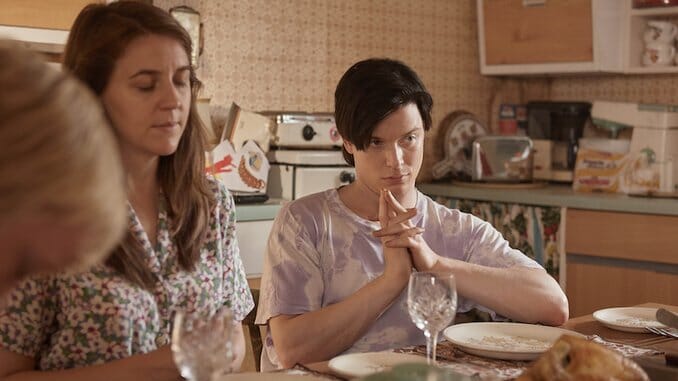The Murders at White House Farm Is a Grim, Frustrating True Crime Tale
Photo Courtesy of HBO Max
If you are the kind of crime show fan who enjoys eagerly following the detectives as they doggedly look for clues and trade theories of the crime, UK limited series The Murders at White House Farm (airing in the US on HBO Max) doesn’t leave much for you in the way of mystery. The true crime case is an infamous one overseas, but for Americans or those who haven’t read the Wiki entry beforehand, the obvious way the show points to the potential killer in the first episode is jarring. However, the who and the why is not really the point of the production; rather, it’s the process (one that was almost derailed numerous times) to bring a killer to justice.
In August of 1985, police were called to a farmhouse in Essex via a pay phone by the son of the owners, who thought something suspicious was afoot when he arrived to darkness and silence. Five members of the same family were eventually found dead inside the locked house, each killed by multiple shotgun rounds in what was immediately deemed a murder-suicide. The surviving family member who had made the call, Jeremy Bamber (Freddie Fox), told police that his sister Sheila (Cressida Bonas) had mental health issues that could have led to her killing her parents, her twin sons, and herself. But one detective on the scene, Stan Jones (Mark Addy) noticed that Sheila had two gunshot wounds—an improbable scenario for a suicide. It was just one of many inconsistencies immediately overlooked by local police who were eager to make this an open and shut case.
As such, the lack of a mystery is not just because the police didn’t think there was one, but because the whodunnit is immediately and obviously telegraphed to viewers. There is no nuance to the series, nor anything particularly interesting about its style or method of storytelling despite a retro setting and some genuinely affecting performances. By the second episode (the last available for review, out of an eventual six), the slain family’s relative Anne Eaton (Gemma Whelan) is already telling the cops flat-out that Sheila was innocent, a plain fact that can only be met with a nod and a shrug.
Thus, The Murders at White House Farm is largely an elongated exercise in frustration, as police mismanage the crime scene, ignore alternate possibilities, and even bully Anne to stop asking questions. The gruesome nature of the murders and the lifeless way the story unfolds really leaves no room for anything other than a dour examination of an otherwise haunting case.
-

-

-

-

-

-

-

-

-

-

-

-

-

-

-

-

-

-

-

-

-

-

-

-

-

-

-

-

-

-

-

-

-

-

-

-

-

-

-

-








































